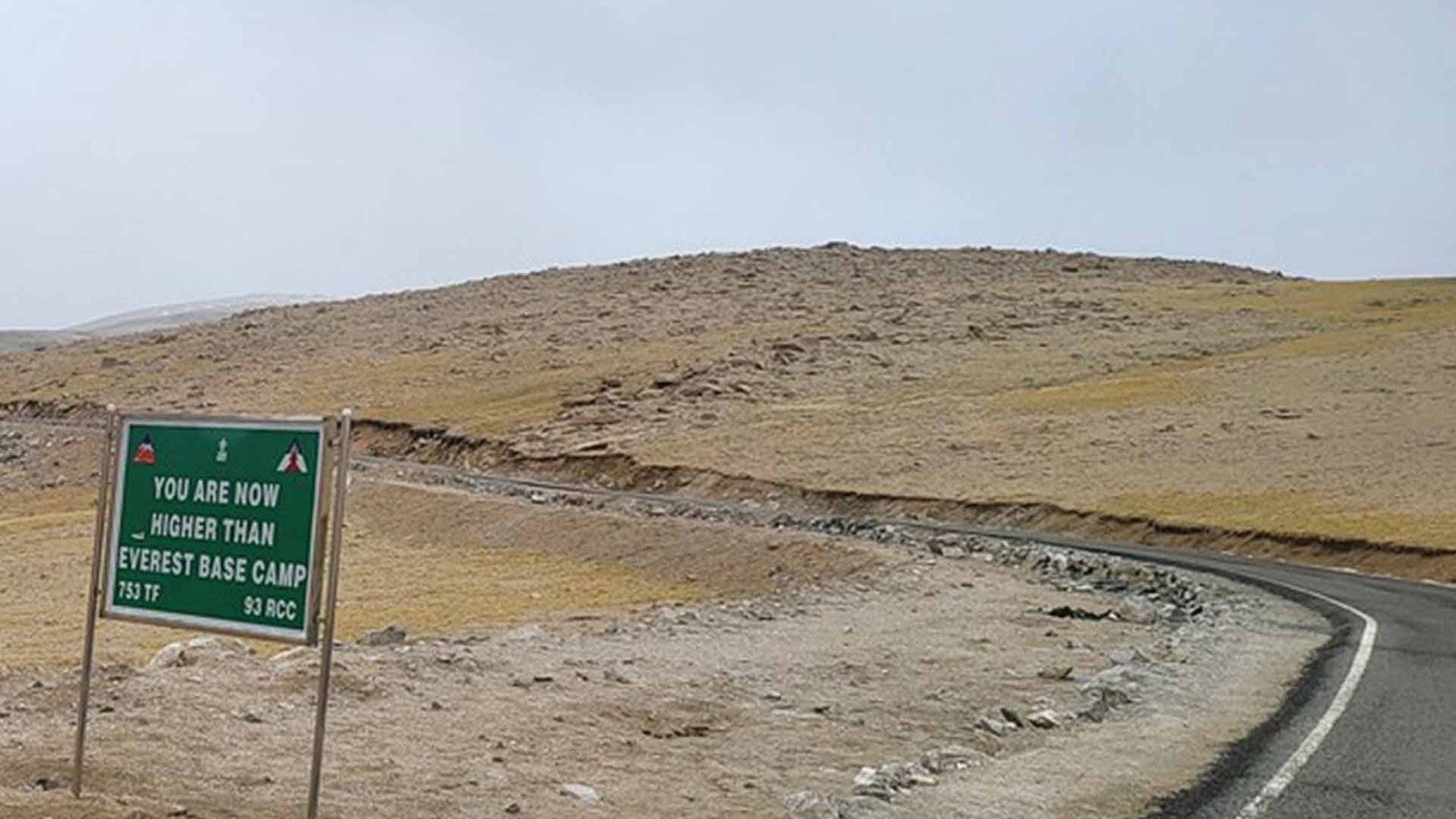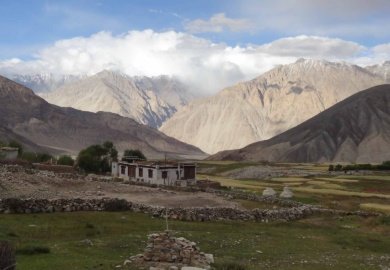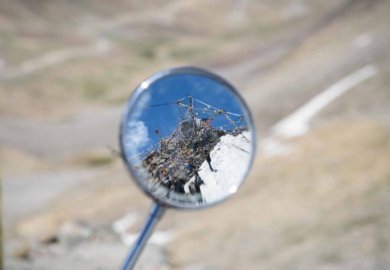Riding toward the world’s highest pass and learning to turn back.
“There is a difference between a wall and a door politely closed.
The mountain, when it says ‘not today,’ is not ending your story.
It is saving the next chapter.”
Counting Returns, Counting Breaths
By 2018, I had stopped counting trips to Ladakh. Numbers couldn’t hold what the land already knew about me the way I reached for its air like a familiar hand, the way I remembered where the wind curled at corners, how tea tasted better after a certain kind of climb. Friends in Leh no longer asked how long I’d stay; they simply asked, “Where next?” and pushed a chipped cup of chai toward the answer.
That year, the rumor had found bone. Umling La a pass whispered about in chai stalls and army canteens, once closed, now open to the public lived at an altitude so audacious it turned breath into arithmetic. I had told myself I would not chase extremes anymore, that I had nothing to prove to a mountain. And yet, the word “open” did what words do when they find a soft place it pressed.
I drew a line with my finger on a map that had learned to forgive my hubris: Leh – Khardung La – Shyok – Pangong (Man–Merak road) – Chusul – Tsaka La – Hanle – Umling La. Back by Ryul Tso, Chilling Tso – Nyoma, then over Pologongka La to the Manali–Leh highway, and home to Leh. It read like a vow made under a sky that didn’t mind being blue all day.
The mechanic in Leh, who had watched me grow older and slightly more patient, tightened my chain without commentary. “Weather is a politician,” he said, dipping a fingertip in gear oil and drawing a small circle on the air. “It changes when you’re not looking.”
I promised to look.
Leh to Khardung La: Familiar Heights, New Intentions
The leaving was muscle memory: dawn that still felt like night, dogs yawning at the end of alleys, the engine’s first cough turning into faith. I carried too little pride and just enough spares tubes, cables, levers, a patch kit, a thermos of tea that could talk anyone down from a ledge.
Khardung La rose like an old question you answer differently each year. The BRO signboards still sang their yellow hymns “Be Gentle On My Curves,” “After Whisky, Driving Risky,” “Better Mr. Late Than Late Mr.” and the wind made its familiar mischief across the visor. The pass, which had once terrified me, now felt like a handshake. Not painless. Not simple. But known.
At South Pullu, documents changed hands with the ritual elegance of tea cups. A jawan glanced at my permits and then at my breath. “Don’t be brave,” he said with a smile that had seen enough. “Be wise.”
The descent opened into Nubra’s spacious grammar sand where rivers braided silk, poplar lines like exclamation marks, prayer flags gossiping between gompas. I did not linger. Umling La hummed like a note under every mile.
Shyok: The Road That Remembers Water
The Shyok road, hewn where river and cliff were mid-quarrel, stitched my attention tight. There are stretches here where the valley narrows its eyes and the river flexes its shoulder. The surface changes mood without warning a stretch of blacktop as smooth as thought, suddenly replaced by gravel that votes against your confidence.
I rode with my elbows loose and my jaw unclenched, as if the mountain could hear teeth grinding. A convoy came the other way, drivers lifting two fingers in that Ladakhi benediction that means everything I see you, we are here, may we both arrive.
At a bend where water had rehearsed a rebellion, a tea tent performed its daily miracle. Blue tarp. Two benches. A kettle that remembered every season. I drank something too sweet and exactly right. The owner pointed at the river, palm flat. “Today she is in a good mood,” he said. The implication did not need words.
Pangong by Man–Merak: The Long Edge of Blue
Pangong never arrives; it reveals. One minute, the land is brushing its teeth; the next, someone has set an astonished mirror into the valley. I skirted the lake’s ragged hem Man, Merak where the blue leans into cobalt and tourists thin into fishermen and dogs. Here, the road is more idea than promise, threading between stone and shore, sometimes picking the wrong side until someone wiser corrects it with a pile of rocks and a prayer.
At Merak, the last tea shop held its breath between kettle and binoculars. A man with wind-drawn lines around his eyes nodded at my permits and said, “Chusul is patient today.” I took the compliment, knowing patience is contagious at altitude.
The lake followed for a while like a quiet companion, then withdrew to do its own thinking. The wind, relieved of witness, rehearsed its theater across the flats. My bike’s thump found a tempo the day approved of.
Chusul: Paper, Gravel, History
Chusul, where maps thin and memory thickens, greeted me with a barrier and a courtesy that felt older than bureaucracy. Papers stamped, questions asked without suspicion. A jawan leaned into the shadow of his cabin and studied the horizon, then me.
“Where?” he asked, though the route on my permit already confessed my intention.
“Hanle,” I said. And then, quieter, “Umling.”
He smiled with the slowness of someone weighing a word. “See the sky,” he said, pointing east. “If it is your friend, keep going.”
I did not ask what to do if it wasn’t. I already knew.
Tsaka La a smaller pass with a big sense of ceremony arrived like a stiff shoulder under the jacket of afternoon. The road climbed in steps someone had carved with a blunt chisel; I picked lines like a man threading a needle with gloves on. At the top, the wind announced itself as landlord and raised the rent on breath.
Hanle: Where Darkness Has An Address
Hanle is a punctuation mark placed exactly where the sentence needs to breathe. Whitewashed homes exhale smoke. The gompa watches the village like a memory that never blinks. And above it all, the observatory sits exposed and certain, a holy place for people whose god is light.
Tsering, whose name is stitched into so many of my maps now, found me again. Or I found her. It is difficult to tell with people who live where roads end and hospitality begins. She showed me a room where the bulb was obedient, the bed was honest, and the window knew how to hold a sky.
“Umling?” she asked, putting a kettle on.
“If the road agrees,” I said.
She laughed softly. “Roads don’t agree. Roads allow.”
That night I walked out past the last wall of Hanle and lay down on the chill earth to let the sky finish a sentence it had begun when I was a boy. The Milky Way bled across the valley, and satellites tried to act like stars until they remembered to move. The word “highest” began to feel too small inside such abundance. I slept with a shawl over my chest and a dog at the door.
The Attempt: A Morning That Tightened
I left before the sun learned the names of things. The air carried a clean edge; the engine’s first cough became grammar. The route to Umling La from Hanle starts as a rumor and then turns into a test. The altitude not a number, a presence stepped closer.
Breath shifted from background to negotiation. I counted five in, hold two, six out not because I am wise, but because fear needs something to do with its hands. The track cut across a plain that didn’t trust me, then began to climb as if remembering an old argument with the sky. BRO stones, stacked with stubborn kindness, told me where someone else had believed a road should be. I tried to agree.
A checkpoint arrived a container, a barrier, an officer who had seen more breathlessness than I would admit to. He took my papers and looked at my eyes longer than he looked at my name.
“How are you feeling?” he asked, emphasis on the you, not the plan.
“Light-headed,” I said. “But okay.”
He nodded at the sky, which had just learned a new color. Clouds pushed in with the energy of latecomers eager to be noticed. The wind changed from curious to urgent. He pointed up-valley. “Wind higher. Snow last night. Ice in shadows.” He let it hang a second. “Alone?”
“Alone,” I said, and the word sounded less romantic here than it does in cities.
“Ride slow,” he said. “Listen.”
I promised I would do both and did not say that promises at altitude feel lighter than they should.
Between Bends and Breath: Where Yes Turns Into Maybe
The climb after the checkpoint began with a conversation I could still win. The track was broken but negotiable, a collage of rock, rut, the occasional ribbon of flattened earth where many wheels had hoped before mine. I kept my shoulders loose and my patience tied tight. The bike and I agreed on ten meters at a time.
Then the day changed its mind.
The wind arrived sideways, confident and uninvited. Snow, carried from other arguments, streaked across the surface and tucked itself into corners where physics could pretend to be poetry. The sun drew a curtain over itself and practiced the expression it wears just before it leaves.
Altitude stepped out from behind its polite disguise and made a formal introduction: Hello. I am the rule here.
I stopped to drink water I did not want. At 19,000 feet, thirst forgets its manners. My head tightened like a fist. The breath-counting lost a digit. I thought I saw the track ahead doing something ridiculous and then realized it was my vision negotiating with blood.
A stone gardened itself under my rear tire; the bike slid the width of regret and stopped because I had no more momentum with which to make a mistake. I put a foot down and felt nothing where I expected something. Ice. A plate, thin and almost loyal.
I waited. Sometimes the only correct verb is wait. The wind told me about people I’d never meet. The mountain listened.
The Turn: What Dignity Looks Like Up Close
We imagine turning back as a story we will one day dress in wisdom. It is less elegant from inside the helmet. It is a series of small, unheroic recognitions. The way the bike feels heavier when it wants to be at home. The way your hands take longer to find the right work. The way the sky stops negotiating and the road stops suggesting and both begin insisting.
I tried one more stretch. The track tilted left into a shadow where last night had not ended. The ice under gravel lied about its loyalty again. The front wheel wrote an opinion I had not asked for. I put both feet down and did the arithmetic: breath per meter, grip per hope, daylight per prayer. In every column, the minus signs multiplied.
Then, as if the day was kind enough to send a witness, a Gypsy crawled down toward me army green, the color of patience. The driver rolled his window and looked at me the way a father looks at a child at the edge of a pond in winter.
“Solo?” he asked.
I nodded.
He looked at my tires, at the sky, at the shadow that still had not forgiven the sun. He lifted his chin toward the summit. “Today is not friendly,” he said. “You can try. Or you can come again.”
I heard the sentence beneath the sentence. I turned the bike around.
It was not dramatic. No violins. No trembling. Just a slow pivot on ground that had decided to make dignity difficult. The wind took one last swipe at my pride. I let it. When the bike pointed back toward Hanle, something in my chest loosened that I had not known was clenched.
I rode down a little. Stopped. Took off my gloves and let my hands remember their names. I looked back once the way you look back at a door you have chosen not to walk through and nodded. Not today.
“Retreat is not the opposite of courage. It is its eldest brother.”
The Return to Hanle: Tea, Silence, Permission
By the time I reached the checkpoint, the officer didn’t need me to explain. He poured tea as if that were the paperwork. “Good,” he said. “Come when the sky is your friend.”
Back in Hanle, Tsering didn’t ask for outcomes. She asked if I was hungry. I was. The thukpa tasted like absolution. The sky, at dusk, performed its old generosity every star arriving as if it had not heard the news about me.
On a wall outside the gompa, someone had painted a wheel with eight spokes. I traced it with my eyes and understood nothing in a way that helped.
Ryul Tso and Chilling Tso: Two Eyes in the Stone
The next morning, the road offered a different sentence east and then south toward Ryul Tso and Chilling Tso, two small blue eyes set into a face carved by wind. The track wound through plains that changed their mind every kilometer. The lakes appeared shyly, then decided to be explicit: ink bowls, rippling under a breeze that had learned to laugh again.
I killed the engine and listened to the kind of quiet that begins to edit your thoughts. A crane stepped the shore with the courtesy of old dances. A kiang froze in that elegant way wild asses do posture of statues, heart of startled birds then remembered itself and went on chewing.
There are wrong turns that correct your life, and there are right turns that do the same. These lakes felt like both a soft punctuation after yesterday’s hard stop. I sat on a rock and counted breath for no reason at all.
Nyoma and Pologongka La: The Long Door Home
Nyoma arrived with the agreeable busyness of a place that knows it is a junction. Papers stamped, biscuits bought, a child tried on my helmet and declared it too heavy, which is not untrue of helmets or of plans.
From there, Pologongka La lifted the road in patient steps less drama than its cousins, more concentration. The view from the top had that Ladakhi efficiency: the valley lined up neatly to be admired, the wind filed its complaints, the sun signed off on the day. I dropped to the Manali–Leh highway and felt the strange comfort of a road that remembered to be a road.
At Upshi, tea understood me. At Karu, a dog crossed with the sovereign confidence of creatures who own towns. At Leh, the guesthouse gate creaked hello and forgave my dust.
The Evening After: How to Sit with “Not Today”
People talk about summit highs because summit highs are easier to talk about. What do you say about a day that stopped you politely at the door? I showered the cold out of my bones and watched the water carry down the slopes of my body as if it had somewhere important to go. I ate two dinners. Sleep arrived mid-sentence.
In the morning, the mechanic asked, “How was the road?” and I said, “Honest,” and he nodded like I had finally learned my first Ladakhi word.
I walked up to Shanti Stupa to let the town arrange itself below me into contexts roofs like thoughts, alleys like hesitations, the palace like a memory that learned to stop asking for attention. Prayer wheels spun because that is what they do whether we arrive or not. I put my palm to one and felt its small stubborn heart beat against mine.
Not today, the mountain had said.
Okay, I replied.
Tomorrow is a kind of wealth, the wind offered.
I’ll come back when I can afford it, I promised.
The Door and the Wall
Umling La did not become a medal on my vocabulary that year. It became a mirror showing me the shape of my breath, the edges of my wisdom, the exact weight of my want. Turning back is a sentence I had practiced in other rooms relationships, careers, roads that went nowhere and insisted but never with such weather in the ink.
When people ask, “Did you make it?” I say, “I made a choice.” And then, if they are kin to roads, I tell them the better story: of a checkpoint officer who read the sky in my face; of wind that argued but did not insist; of lakes that gave me back what pride had taken; of a mountain that closed a door before I could mistake it for a wall.
I will go again. I know this the way I know prayer flags are louder in winter. I will pick a day when the sky has forgiven what it was angry about, when my breath has agreed to be my accomplice, when the road writes itself under my tires with that particular Ladakhi handwriting stubborn, generous, exact.
And if the mountain says not today again, I hope I will have the sense to hear the love in it. Because that is what restraint is, finally: love dressed as caution, keeping the next chapter safe.
“The bravest thing I did on that road was not arrive.
It was decide I would like to another day.”




